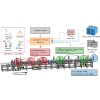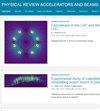加速器物理学的贝叶斯优化算法
IF 1.8
3区 物理与天体物理
Q3 PHYSICS, NUCLEAR
Physical Review Accelerators and Beams
Pub Date : 2024-08-06
DOI:10.1103/physrevaccelbeams.27.084801
引用次数: 0
摘要
加速器物理依赖数值算法来解决在线加速器控制中的优化问题,以及模拟中的实验设计和模型校准等任务。优化算法在利用有限资源为复杂挑战发现理想解决方案方面的有效性,往往决定了这些方法所能解决的问题的复杂性。加速器物理学界已经认识到贝叶斯优化算法的优势,它利用目标函数的统计代用模型来有效解决复杂的优化难题,尤其是在加速器运行过程中存在噪声和资源密集型物理模拟的情况下。在这篇综述文章中,我们从概念上概述了如何应用贝叶斯优化技术解决加速器物理中的优化问题。首先,我们对构成贝叶斯优化技术的基本要素进行了简单解释。然后,我们概述了当前和以往应用和修改这些技术来解决加速器物理难题的工作。最后,我们探讨了贝叶斯优化算法的实际实施策略,以最大限度地提高其性能,使用户能够有效地解决实时光束控制和加速器设计中的复杂优化难题。本文章由计算机程序翻译,如有差异,请以英文原文为准。

Bayesian optimization algorithms for accelerator physics
Accelerator physics relies on numerical algorithms to solve optimization problems in online accelerator control and tasks such as experimental design and model calibration in simulations. The effectiveness of optimization algorithms in discovering ideal solutions for complex challenges with limited resources often determines the problem complexity these methods can address. The accelerator physics community has recognized the advantages of Bayesian optimization algorithms, which leverage statistical surrogate models of objective functions to effectively address complex optimization challenges, especially in the presence of noise during accelerator operation and in resource-intensive physics simulations. In this review article, we offer a conceptual overview of applying Bayesian optimization techniques toward solving optimization problems in accelerator physics. We begin by providing a straightforward explanation of the essential components that make up Bayesian optimization techniques. We then give an overview of current and previous work applying and modifying these techniques to solve accelerator physics challenges. Finally, we explore practical implementation strategies for Bayesian optimization algorithms to maximize their performance, enabling users to effectively address complex optimization challenges in real-time beam control and accelerator design.
求助全文
通过发布文献求助,成功后即可免费获取论文全文。
去求助
来源期刊

Physical Review Accelerators and Beams
Physics and Astronomy-Surfaces and Interfaces
CiteScore
3.90
自引率
23.50%
发文量
158
审稿时长
23 weeks
期刊介绍:
Physical Review Special Topics - Accelerators and Beams (PRST-AB) is a peer-reviewed, purely electronic journal, distributed without charge to readers and funded by sponsors from national and international laboratories and other partners. The articles are published by the American Physical Society under the terms of the Creative Commons Attribution 3.0 License.
It covers the full range of accelerator science and technology; subsystem and component technologies; beam dynamics; accelerator applications; and design, operation, and improvement of accelerators used in science and industry. This includes accelerators for high-energy and nuclear physics, synchrotron-radiation production, spallation neutron sources, medical therapy, and intense-beam applications.
 求助内容:
求助内容: 应助结果提醒方式:
应助结果提醒方式:


